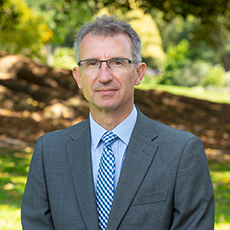Key facts
- The Renewable Energy Microgrid forms part of the Geelong Future Economy Precinct at Waurn Ponds campus
- It is the largest solar farm to be installed on an Australian university campus
- The microgrid solar farm covers 14 hectares, with over 20,000 solar panels and energy storage working and supplying electricity
- It is capable of supplying 54% of the Waurn Ponds campus’ power usage
- In addition to providing additional education and research opportunities for students, the microgrid will help Deakin University to become carbon neutral by 2025
A viable energy alternative
Deakin’s renewable energy microgrid is providing substantial returns through research, teaching and learning opportunities. It’s also a core element in Deakin’s pathway to achieve carbon neutrality by 2025.
In addition to contributing to Deakin University’s commitment to reduce our greenhouse gas emissions, the renewable energy microgrid provides our researchers an unparalleled opportunity to participate in important energy research in Australia and globally.
The project, delivered in partnership with AusNet Services and Mondo Power, is a combination of a seven-megawatt solar farm, Australia’s first grid-connected megawatt-scale lithium iron phosphate battery, and 0.25-megawatt solar generation and storage across the rooftops of campus buildings.
Along with the Microgrid Visualisation Centre in Deakin’s Centre for Advanced Design in Engineering Training (CADET), the project forms part of the Geelong Future Economy precinct at the Waurn Ponds campus.
In response to a changing climate, the global energy sector is undergoing a rapid transformation as governments, corporations and communities look for sustainable power generation options that can also support economic growth. The renewable energy microgrid transforms the campus into a ‘living laboratory’ that demonstrates the viability of microgrid applications and also meets the university’s own sustainability goals.
In their 2017 Electricity Network Transformation Roadmap report, the CSIRO and Energy Networks Australia identified microgrids and other standalone power systems as integral to keeping our grids stable as we transition to renewable energy. The report predicts that, in some cases, these systems could even be a cheaper alternative to traditional grid supply.
Without a full-scale facility to research the viability and reliability of microgrids, questions about transitioning to new power systems will remain. Deakin’s renewable energy microgrid is an investment in resolving this uncertainty.
Early research is directed at projects including the development of a digital twin for research and operations, the application of circular economy principles for the recycling of PV solar panel materials, the use of microgrids for grid stability services, and reinforcing cybersecurity which will remove risk from the application of microgrids in Australia and across the globe.
The benefits are threefold
In addition to providing important research outcomes, the microgrid is designed to supply over 50 percent of the power consumption at Deakin’s Waurn Ponds campus, seeing a massive reduction of greenhouse gas emissions. There’s also research, teaching and learning opportunities for students.
Deakin’s research seeks to understand a microgrid from both ‘behind the meter’ (within the campus network in our case), and within a defined community with differing demands from manufacturing facilities, corporate offices and accommodation. The research will address technical and commercial questions, and importantly, social challenges – such as equity and participation in the new opportunities presented by the technology – will also be considered.
Outcomes of the research will also enable Deakin to understand and better manage our own energy use and achieve our goal of becoming carbon neutral by 2025. This knowledge is already being shared with our communities and stakeholders.
The Microgrid Visualisation Centre is the perfect venue to train the energy professionals of the future and will offer students enhanced work integrated learning and internship opportunities with industry partners. By showcasing the project for industry and community innovation, the research and knowledge developed will provide industry guidance. Working with researchers and industry in developing the system further in the future, Deakin seeks to discover other technological possibilities for the microgrid, such as hydrogen storage and electric vehicle integration.
Fully operational in 2021
The solar farm is operational and providing electricity to the Deakin Waurn Ponds Campus, with the renewable energy microgrid to be fully commissioned in April 2021.
According to the 2019 carbon emissions profile, 79% of Deakin’s emissions came from using electricity. The microgrid is capable of supplying 54% of the current power consumption on the Waurn Ponds campus, reducing 12,000 tonnes of greenhouse gas generated on site each year. Importantly, the microgrid’s presence on campus focuses the university’s attention on energy efficiency, and how to implement further measures across its campuses.
Grants and Funding
Project sponsor Dr Adrian Panow, Director, Deakin Energy works with researchers from the Schools of Engineering and IT, Faculty of Business and Law, Faculty of Arts and Education, Institute for Frontier Materials and IISRI. It is anticipated that other research groups within Deakin, such as A2I2 will participate in further research as the full microgrid system comes online.
Collaboration and commercialisation
The fully operational facility offers new research and development opportunities for industry, with potential for on-site testing of new PV panels, batteries and optimisation models. It also offers commercial opportunities to Deakin itself through participation in electricity markets such as the provision of ancillary services.
This project has been completed in partnership with AusNet Services and Mondo Power. AusNet Services is already providing substantial funding to support this and other renewable energy research projects.
Commonwealth and Victorian government funding agencies are being approached to support new research which would not have been possible without Deakin’s investment in infrastructure.
Contact us
For more information about our research impact contact Deakin Research.

